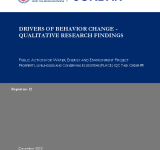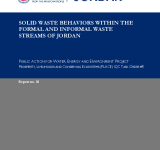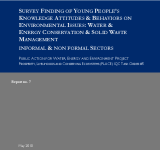The report aims to understand the outlook of Jordanians;; the key determinants of behavioral change in search for “drivers” that can be used in programs promoting conservation of water or energy and reduction of solid waste. This research was conducted as part of the Public Action for Water;; Energy and Environment Project (PAP);; which aims to encourage water and energy conservation and to support behavior change towards more conservation and efficient practices both at the household level and in the commercial;; industrial and civil society arenas using social marketing behavioral methods. It is based on the qualitative research that focuses on identifying people’s motivations;; needs and desires to help formulating social marketing programs and developing adaptive capacity in individuals and groups. Some of the key questions of the qualitative research include “What are the current coping behaviors and attitudes (psychological;; social;; etc …) of the Jordanian public (disaggregated by gender;; age;; geography and income) in the face of limited water availability and high prices for energy?;; What anticipated consequences may the Government face if stricter scenarios were imposed on water and energy? The report recommends the Ministry of Education to cooperate and introduce regular classes that focus on showing youth the direct impact of water;; energy and environment on their lives and raise awareness and consciousness of children regarding their role in the environment and influence it in a positive way.


